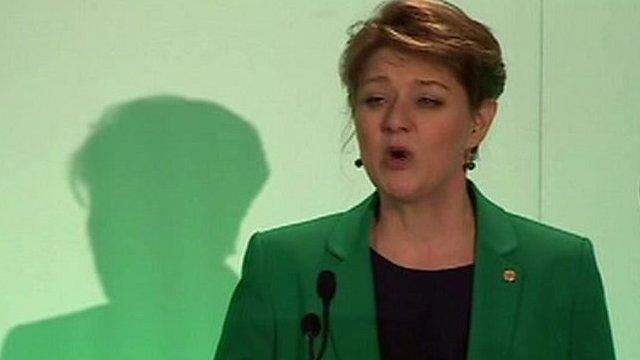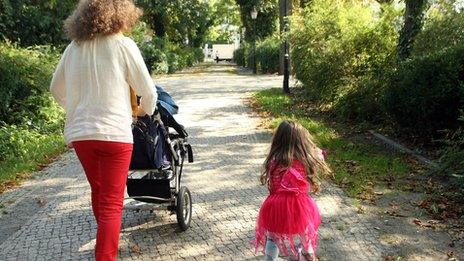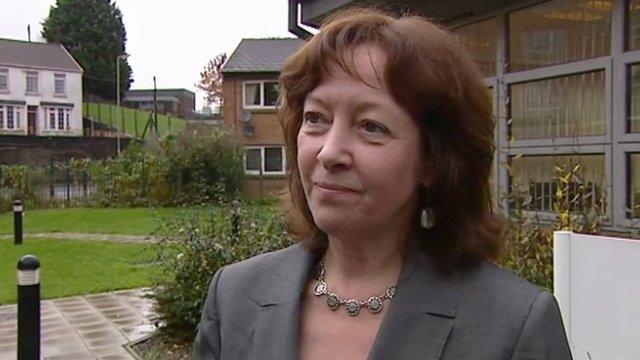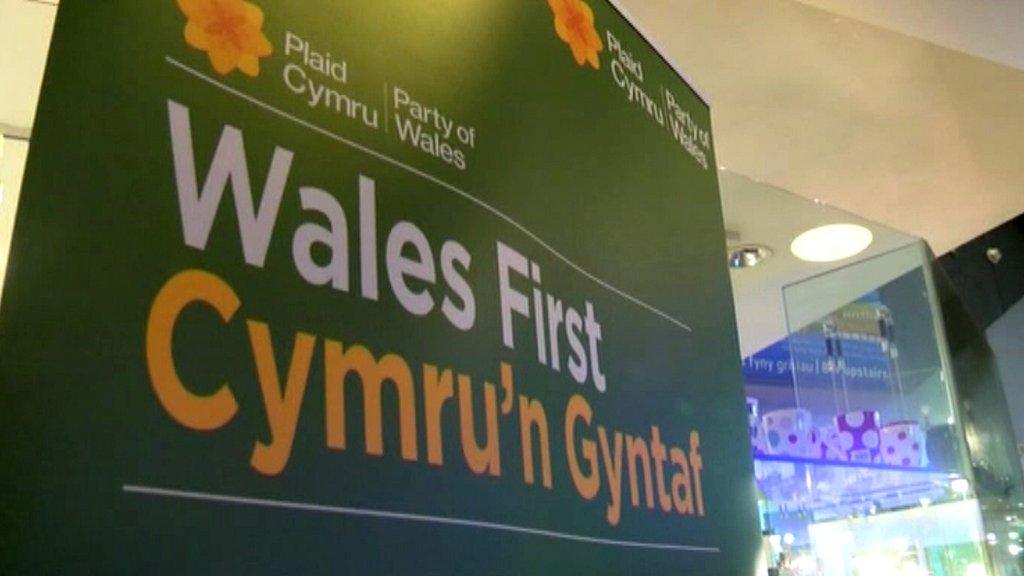Plaid's Dafydd Elis-Thomas condemns leader's UKIP attack
- Published
Political reporter James Williams reports for BBC Wales Today
Plaid Cymru leader Leanne Wood has been criticised for her fierce attack on UKIP by a former party leader.
Dafydd Elis-Thomas, the former assembly presiding officer, condemned Ms Wood's description of a vote for UKIP as a vote against Wales in her speech to the Plaid Cymru spring conference.
He said: "It is facile and assumes a kind of superiority that we decide who is Welsh and who is not Welsh."
Meanwhile, MEP Jill Evans appealed for backing in May's European elections.
'Point of view'
In a direct message to the party ahead of May's European election, Ms Wood said on Friday: "Your politics have no place in our country, not now, not ever.
"Your values are not the values of Wales. A vote for UKIP is a vote against Wales - a vote against the Welsh national interest. We cannot and will not let their ugly politics divide us in May."
UKIP criticised Ms Wood's attack as "gutter politics and mud slinging".
On Saturday, Lord Elis-Thomas told BBC Wales' political editor Nick Servini: "A party which gets votes from ordinary citizens in Wales has to be taken seriously.
"It clearly represents a point of view in Wales."
On Saturday, Plaid MEP Jill Evans promised the Cardiff conference to press for changes to make the EU "more relevant" and "democratic".
She said the challenge posed by climate change was "as real" as the economic crisis, and called for Wales and the EU to work together to exploit the nation's renewable energy potential.
"We've heard so much, in the past couple of days, about the huge potential we have as a powerhouse for renewable energy," she said.
'Shifted the focus'
"We must work with the European Union to develop that potential.
"We need serious investment in green jobs to build a sustainable economy."
Ms Evans also echoed concerns expressed by Ms Wood on Friday that "Europhobia" could win the day during the European election on 22 May and damage Welsh interests.
The MEP said: "I understand why people have lost faith in Europe, but the answer is not to walk away.
"The answer is to change it.
"The economic crisis pushed Europe to its limits. It shifted the focus from people and on to markets.
"That must change now, and we have to change it".
Concluding her speech, she said Plaid Cymru was the only party "that protects the Welsh national interest and promotes that interest in the European parliament.
"We're the only party that puts the interests of the people of Wales first.
Peace corps
"We're not told what to do by anyone other than the people of Wales," she said.
Ms Evans won applause for calling for the creation of a "European civilian peace corps" to mark the centenary of the outbreak of World War One.
"Instead of moving towards setting up a European army, which is what some are trying to do, let's establish a European civilian peace corps," she said.
"Not soldiers, but teachers, engineers, lawyers - all those people with skills that can work in areas of potential conflict to prevent violence and increase tolerance and understanding."
Opening the second day of the conference, Plaid education spokesman Simon Thomas revealed plans for a taskforce to cut "red tape and form-filling" in schools.
'Second rate'
He said: "In government we will move immediately to work with the trade unions and the [teaching] profession to eliminate unnecessary bureaucracy and, particularly, to free up good teachers to be innovative and flexible themselves.
"We will challenge the outcomes, rather than the processes, so things get done by professionals."
Mr Thomas said that where teaching was "poor or mediocre", Plaid would intervene to improve things.
Criticising the performances of successive Labour ministers who had been responsible for education in Wales, he said they had avoided "responsibility for standards" and had been "putting up with the second rate".
He added: "Do Labour not understand that our education today is our economy tomorrow?"
- Published7 March 2014

- Published6 March 2014

- Published25 February 2014

- Published11 February 2014

- Published11 February 2014
